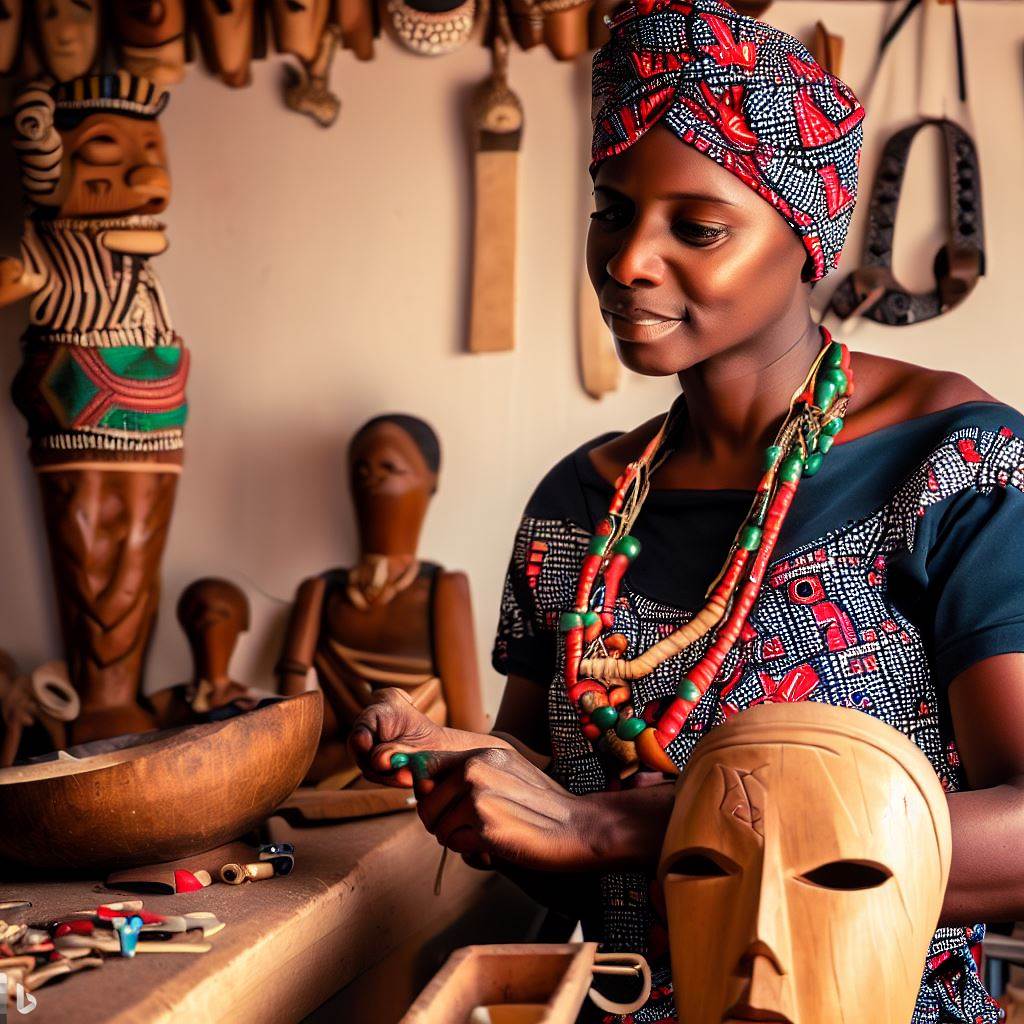Introduction
Craft business in Nigeria has been an integral part of the country’s economy. Nigeria is rich in culture and tradition, and these are reflected in the various crafts produced in the country.
There are diverse forms of craft businesses in Nigeria, such as pottery, bead making, weaving, carving, and others. These crafts have been passed down from generation to generation, and they represent the country’s cultural heritage. Successful craft businesses in Nigeria play a crucial role in the country’s economy. These businesses provide employment opportunities for thousands of Nigerians, and they contribute significantly to the nation’s GDP.
Moreover, successful craft businesses attract tourists from different parts of the world, who are interested in learning about Nigeria’s cultural heritage. Through these businesses, Nigeria’s cultures and traditions are preserved and promoted to the world.
In recent years, successful craft businesses in Nigeria have gained recognition globally. These businesses have been able to harness new technologies to their advantage, and at the same time, they have maintained the traditional methods of production.
Additionally, they have been able to target both the local and international market, thus expanding their customer base.
In essence, successful craft businesses in Nigeria are crucial to the country’s economic development. They preserve the cultural heritage of Nigeria, create employment opportunities, and contribute to the nation’s GDP.
Case Study One: Terra Kulture
Terra Kulture, a successful cultural center in Lagos, promotes Nigeria’s rich heritage through a multipurpose approach.
Key features of Terra Kulture
- Cultural promotion through events, concerts, and plays.
- A restaurant with unique local and continental delicacies.
- A well-curated bookshop for learning about Nigerian history and culture.
- Marketing via word-of-mouth and social media for customer attraction and retention.
- Expansion to other states like Abuja, showcasing the brand’s success.
Challenges faced by Terra Kulture
- Educating people about the concept of a cultural center.
- Finding staff aligned with the company’s vision.
Overcoming challenges
- Staying true to the core vision of promoting African culture.
- Involvement of the CEO, Bolanle Austen-Peters, in the day-to-day operations.
Terra Kulture’s success serves as a model for profitable ventures in Nigerian culture, attracting numerous patrons.
Read: The Global Influence of Nigerian Craftsmanship
Case Study Two: Zahara Designz
Zahara Designz is a successful craft business located in Lagos, Nigeria. The business specializes in designing and crafting unique and stylish beaded jewelry, hair accessories, and bags.
Overview of the Business
- Founded in 2013 by Zahara Adebowale, a young and talented entrepreneur.
- Started as a small home-based business with few clients but has now grown into a reputable brand with a large customer base.
- Offers a wide range of handmade beaded products that are unique and affordable.
Unique Selling Point
- The business is known for its excellent product quality and creativity.
- The brand’s designs are innovative and trendy, making them stand out in the market.
- Zahara Designz offers customized designs tailored to fit the specific needs and preferences of its clients.
Marketing Strategy
- The business has a strong digital presence with an active website, social media pages, and online store.
- The brand uses digital marketing tools like search engine optimization (SEO) and pay-per-click (PPC) marketing to attract more customers to its online store.
- The business also partners with major retailers and fashion houses to showcase its products, and also sponsors events and fashion shows to drive brand awareness.
Business Model
- The business operates on a direct-to-consumer (DTC) model, selling its products through its online store and website.
- It also has several distribution channels, including partnership with fashion houses and major retailers to reach a wider range of customers.
- Zahara Designz employs a team of skilled artisans who create the handmade beaded products to ensure consistent quality and timely delivery of orders.
Challenges Faced and How They Were Overcome
- One of the major challenges faced by Zahara Designz was the difficulty in sourcing high-quality beads and materials locally. To overcome this, the business began to import most of its raw materials from reliable international suppliers.
- Another challenge was the lack of significant funding to scale up the business. To address this, the brand adopted a bootstrapping approach where profits were reinvested back into the business to fund its growth.
- The business also faced competition from other handmade craft businesses. To stay ahead, Zahara Designz focused on innovating its designs and improving its quality to differentiate itself from other brands.
In addition, Zahara Designz is a prime example of a successful craft business in Nigeria.
With its unique designs, focus on quality, and innovative marketing strategies, the business has been able to stay ahead of the competition and grow into a reputable brand.
Read: The Crafts of Nigeria: Celebrating Diversity and Talent

Case Study Three: Nike Art Gallery
Nike Art Gallery is a renowned art gallery in Lagos, Nigeria, founded in 1983 by Nike Davies-Okundaye, a renowned artist and textile designer.
The gallery features a vast array of art pieces, ranging from traditional Nigerian art to contemporary African art.
Unique Selling Point
- Nike Art Gallery is the largest art gallery in West Africa, with five floors of exhibition space.
- The gallery features unique art pieces that cannot be found anywhere else, making it a one-stop-shop for art lovers.
- The gallery also offers art classes, workshops, and residency programs, making it a hub for artists and creatives.
Marketing Strategy
- The gallery leverages social media platforms like Instagram and Twitter to showcase its art pieces and promote upcoming events and exhibitions.
- The gallery also hosts events and exhibitions that attract art enthusiasts and collectors from all over the world.
- The gallery boasts of a diverse clientele, including art enthusiasts, collectors, and tourists.
Business Model
- The gallery operates a commission-based model, where it takes a percentage of the sale of any artwork sold through the gallery.
- The gallery also generates revenue through art classes, workshops, and residency programs.
- The gallery also partners with corporate organizations that are looking to purchase art pieces for their offices or spaces.
Challenges Faced and How They Were Overcome
- One of the significant challenges faced by the gallery was attracting international collectors and buyers. To overcome this, the gallery began hosting more international exhibitions and partnering with international art dealers and collectors.
- The gallery also faced the challenge of maintaining its authentic African appeal while catering to a global audience. To overcome this, the gallery remained true to its African roots while also embracing contemporary art trends.
- Another challenge faced by the gallery was the lack of support from the government and financial institutions. To overcome this, the gallery sought partnerships with private sector organizations and individual donors to fund its projects and activities.
Additionally, Nike Art Gallery has been able to thrive in the Nigerian art scene, thanks to its unique selling point, marketing strategy, business model, and ability to overcome challenges. It serves as an inspiration to other craft businesses in Nigeria and beyond.
Read: A Closer Look at Trade Skill Education in Nigeria
Factors contributing to the success of these businesses
Craft businesses in Nigeria experienced significant growth due to multiple contributing factors that put them on the map.
Factors contributing to their success
- Innovation: Introducing unique products distinguished them from competitors.
- Marketing strategies: Effective marketing expanded their customer base using social media and digital platforms.
- Quality of products: High-quality, durable, and appealing products differentiated them in the market.
- Customer satisfaction: Building loyalty through excellent customer service and high-quality products.
These factors enabled Nigerian craft businesses to stand out in a competitive market, attracting a loyal customer base. Their success demonstrates that the right strategies and approach can thrive in challenging markets.
Read: How Nigerian Craftsmen Are Innovating Traditional Arts
Conclusion
Craft businesses in Nigeria play a crucial role in the country’s economy. The successful case studies highlighted the importance of creativity, innovation, and strategic planning in running a profitable craft business.
Their success stories demonstrated that with proper planning, dedication, and hard work, anyone can build a successful craft business. It is encouraging to see how these entrepreneurs have not only made a name for themselves but have also created employment opportunities for others.
If you are a potential craft entrepreneur in Nigeria, take this as a sign that you too can make your dreams come true.
Remember to identify your niche, develop a unique selling point, research your market, and continuously innovate. With these lessons in mind, you are on your way to building a successful craft business in Nigeria.




